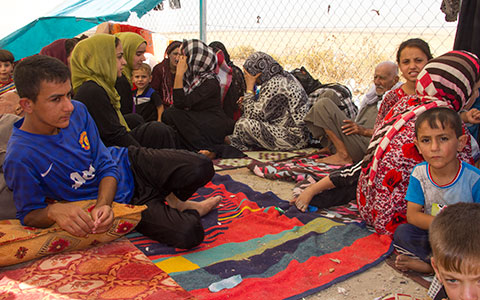EXCLUSIVE - EXODUS FROM IRAQ: Erbil Archbishop interviewed
by - 8th August 2014
 THOUSANDS more Christians are fleeing northern Iraq, as Islamist militia tighten their control on territory previously held by Kurdish Peshmerga forces.
THOUSANDS more Christians are fleeing northern Iraq, as Islamist militia tighten their control on territory previously held by Kurdish Peshmerga forces.
Among the latest towns to fall is Qaraqosh, which had been the largest remaining Christian enclave in Iraq.
The town’s new rulers are Islamic State, formerly known as ISIS, which issued the ultimatum to Christians in Mosul: convert, pay protection money - a levy known as jizya - or be killed.
According to news reports thousands are now heading for Erbil in the autonomous region of Kurdistan, joining the exodus of Shia Muslims and Yazidis from Islamic State control.
Many Christians have been driven from their homes before, in the chaotic aftermath of the allied invasion of Iraq in 2003, as the Chaldean Archbishop of Erbil, Bashar M Warda, explained to Lapido Media.
‘After 2003, there was a big change in Iraq. The violence and attacks against Christians made them leave Baghdad, Mosul, Basra and Kirkuk. Half the community left the country. Two–thirds of the Christians who were in Iraq before 2003 have now left. We were above one million; now you hardly find 300,000. It’s a really sad story.
‘[Before Islamic State took over] we had around 40 – 50 families inside Mosul. There were no salaries for Christians working within the government departments or institutions. Christians had been sacked from their positions.
Crisis
‘Then in June, the present crisis of Mosul started. June was the first month in 1,600 years that Mosul did not celebrate any mass. The first time!
‘From what we hear, Mosul is now under the control of many groups, not just one. And each group has its own way of ruling. There is an atmosphere of fear, which has led our Christian families to leave.
‘Christians have lost trust in the land and in the future. Baghdad is also still losing families. They don’t trust the country anymore and they don’t trust the political process. It is chaotic.
‘People are afraid of the situation. [Islamic State] are going to implement a reading of the Islamic sharia, which is very fanatical. Christians are [regarded as] second or third-class citizens. They have to pay jizya, the Islamic tax.’
Lapido Media (LM): Are Christians right to go? What would be your message to those who are thinking of leaving?
Archbishop of Erbil, Bashar Warda (BW): ‘Of course, the Christians who are leaving are looking for security, for a peaceful life, for jobs, for housing. But security is their first priority, because over the last ten years the attack has been immense, really, on Christians.
 ‘So when they come to us and we encourage them to stay, they say, “Well, who is going to guarantee the security for our families, our children?” And of course, we are unable to make any promises. So we have told all the Christians, please, leave your property behind you and save your life, because life is more valuable.
‘So when they come to us and we encourage them to stay, they say, “Well, who is going to guarantee the security for our families, our children?” And of course, we are unable to make any promises. So we have told all the Christians, please, leave your property behind you and save your life, because life is more valuable.
‘I don’t like them to leave. Emigration is not an easy choice. They have to go to Lebanon, to Turkey, to Jordan, and wait and wait and wait – two years, three years, up to six years, who knows? They spend a lot of money and most of the time their children don’t have the right to go to a school. And when they reach a safe country like Canada, Australia, America or Europe, then they must start again. It’s really very hard.’
LM: Would you describe this as people who are fleeing turmoil and war, or is there an element of religious persecution about this?
BW: ‘It’s a mixture of religious, political, social and cultural persecution. We have people who were killed because they were Christians. So many families were forced to leave their homes because they were Christians. We have people who were kidnapped and killed because they were Christians and others who were kidnapped and paid ransom. It’s a mixture of all of these together.
LM: So what would you see as being the future for Christians in Iraq?
BW: ‘I’m afraid that I imagine a country where you have many Christian sites, like monasteries and churches, just for tourism. That would be one of the scenarios we are seeing, due to the families who are leaving. It would be a sad story to tell, but sometimes we have to think of the reality, and the reality as it shows now is not promising.’
LM: What could be done to prevent that exodus?
BW: ‘First to put pressure on the Iraqi politicians to solve these political disputes. Once it’s been solved change will happen. People will have trust that there can be a future. Unless this is done, we will see more people leaving, including Shia and Sunni families.
‘Unless [we can achieve] political reconciliation that is authentic and stable with the concrete goals of getting all of the country together, these things are going to get worse.’
